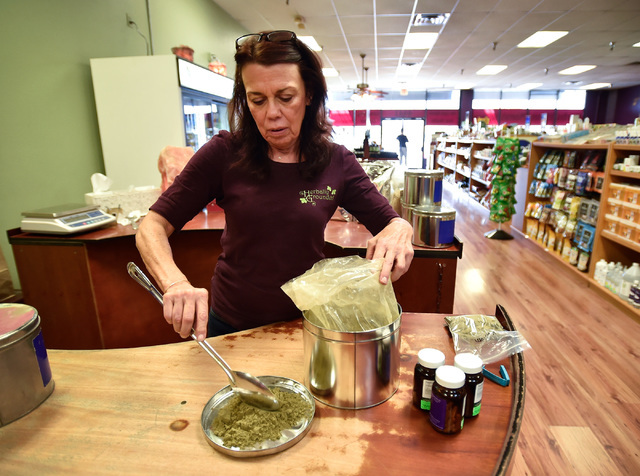Users of herbal pain-reliever kratom up in arms over DEA’s move to ban it




A move by the U.S. Drug Enforcement Administration to ban kratom — an Asian herb with pain-relieving properties — has local users and alternative medicine advocates up in arms.
The DEA announced last week that it plans to classify the active ingredients of the plant — mitragynine and 7-hydroxymitragynine — as a Schedule I drug under the Controlled Substances Act.
Saying the herb poses an “imminent hazard to the public safety,” the DEA said in a news release that the Schedule 1 classification is merited because kratom “has a high potential for abuse, has no currently accepted medical use in treatment in the United States and has a lack of accepted safety for use under medical supervision.”
The move would make it illegal to manufacture, distribute or possess kratom for two years under the temporary classification, which would take effect “as soon as possible” after a 30-day notice period ends Sept. 30.
Kratom advocates in Nevada and other states are crying foul, saying the plant has been used for thousands of years in Asia and is a natural alternative to opioid prescription drugs like hydrocodone, oxycodone and morphine.
“We are now facing our darkest hour,” the American Kratom Association said on its website. “Countless people depend on this safe and effective herbal remedy related to coffee that was sacred to the Buddhists, who have used it safely for thousands of years.”
Kratom leaves can be chewed or crushed into a powder, which can be consumed in capsules, smoked or mixed with liquids like tea. Advocates of the plant report it can relieve chronic pain caused by a range of illnesses and can also be used to wean patients off opiates, both prescription drugs or illegal forms like heroin.
Advocates say the plant is effective and safer than legal opioids, which killed more than 14,000 Americans in 2014.
Becky Boyd, an herbalist at Las Vegas health food store Herbally Grounded, said she takes about a teaspoon a day to relieve severe aches in her legs, a condition that has plagued her all her life.
“I was happy because it was like, ‘Now I remember what it feels like to not have pain,’ ” she said of her experience with kratom.
The shop’s owner, Angela Harris, said her business is circulating a petition in response to the DEA move, criticizing what she believes is a rule to protect pharmaceutical companies.
“We can list on and on herbs that become illegal because it interferes with the sale of pharmaceuticals,” she said.
The kratom association also said it was planning a march at the White House on Sept. 13 to demonstrate support for the herb and attempt to get the DEA to reverse its decision.
The DEA said via social media Friday that it had heard from hundreds of kratom supporters and thanked them for their feedback.
But in its announcement last week, the agency said authorities have reported 15 kratom-related deaths over the past two years and that U.S. poison centers fielded 660 calls related to kratom exposure between 2010 and 2015. Many of those incidents involved people using the herb to get high, not for therapy, it said.
“Kratom is abused for its ability to produce opioid-like effects and is often marketed as a legal alternative to controlled substances,” the DEA said. “Law enforcement nationwide has seized more kratom in the first half of 2016 than any previous year and easily accounts for millions of dosages intended for the recreational market.”
Depending on dosage, users can experience stimulant or sedative effects. Side effects typically are mild, and include nausea, itching, sweating, dry mouth, constipation, increased urination and loss of appetite, according to the DEA.
But long-term users have also reported anorexia, and more serious effects include psychosis, seizure, hallucinations and death, it said.
Contact Pashtana Usufzy at pusufzy@reviewjournal.com or 702-380-4563. Follow her on Twitter: @pashtana_u


















